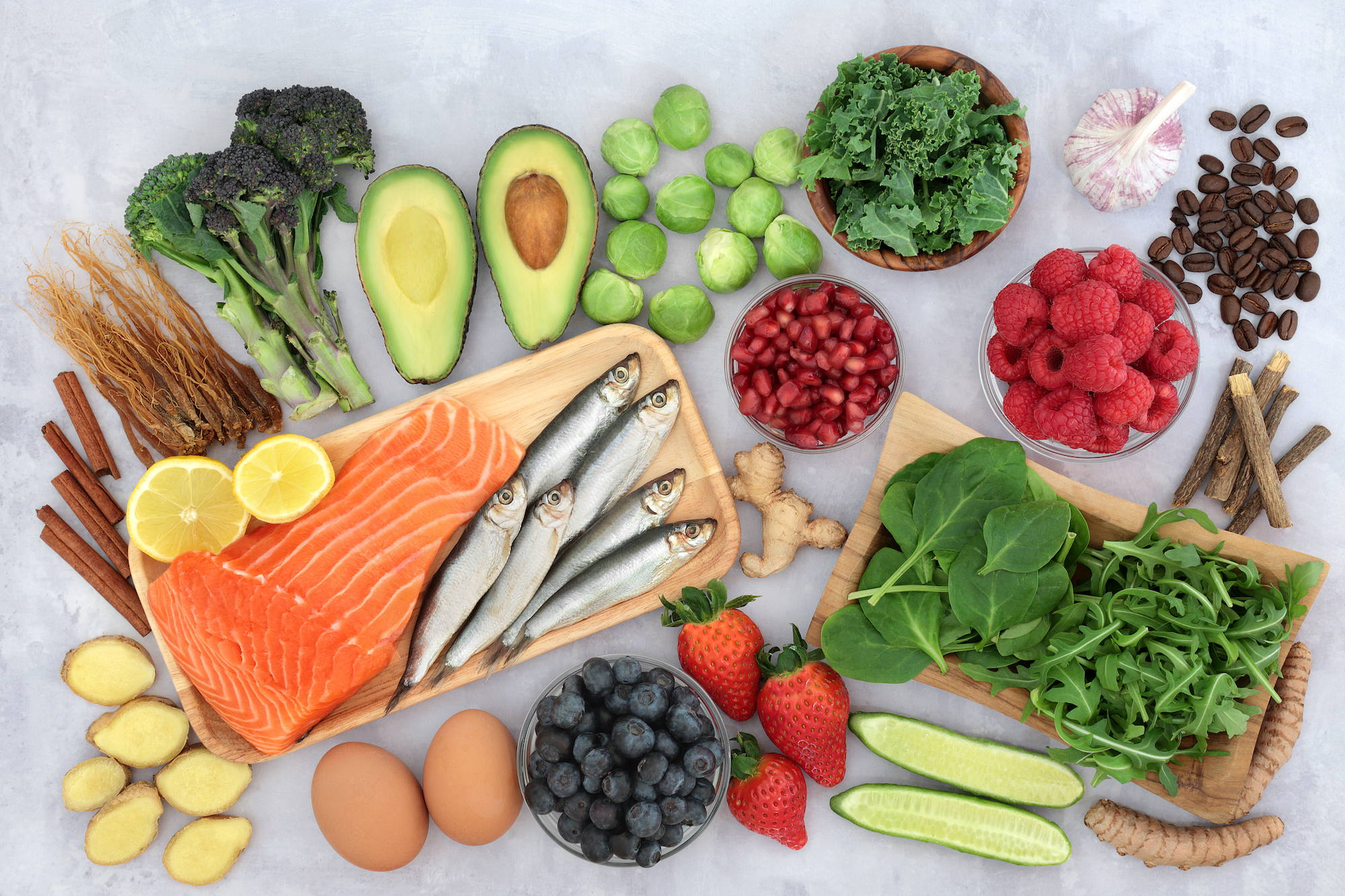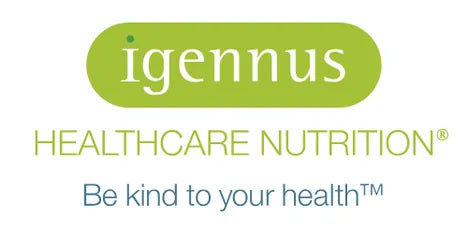More than ‘just a headache’, migraines can be debilitating and seriously affect wellbeing for sufferers. In this article, Dr Danielle Crida answers some common questions about migraines, with a deep dive into the triggers and theories of why migraines occur, and how implementing dietary and lifestyle changes may significantly improve quality of life.

What is migraine?
A common neurological condition, best known for its main symptom of intermittent, severe headaches, migraine has a strong genetic predisposition and affects more women (incidence 5-25% with a lifetime prevalence of up to 50%) than men (2-10% incidence). (1) It often begins during puberty and peaks in middle age during the most productive and stressful phase of life. (2) Attacks vary in frequency from daily to less than one per year, and have 4 distinct phases:
- Prodrome: Hours or days before an attack, some sufferers (migraineurs) experience warning symptoms such as tiredness and yawning, neck stiffness and food cravings (2)
- Aura: 20% of migraineurs experience sensory symptoms - visual (e.g. flashing lights), auditory (e.g. tinnitus) or tactile (e.g. skin tingling), or motor symptoms (e.g. clumsiness), which usually last for less than 1 hour
- Pain phase: Headache and associated symptoms lasting 4-72 hours
- Postdrome: Many feel fatigued and depressed, whereas others experience a euphoric feeling for up to 2 days after an episode
How are migraines different from headaches?
Tension headaches, the most common type of headache, are dull and steady with no associated symptoms and can feel like a tight band around the head. They are usually caused by tight muscles in the neck and scalp due to stress, anxiety or bad posture.
In contrast, a migraine headache is often intense and throbbing, sometimes felt on only one side of the head, and usually accompanied by other symptoms such as nausea and vomiting, and light, sound or smell sensitivity. Pain worsens with simple activity such as walking or bending over and when severe, necessitates lying still in a quiet, dark room.
What actually happens during a migraine?
An area of the brain becomes overexcited, triggering ‘cortical spreading depression’ (CSD) - a slow wave of electrical activity and blood vessel narrowing that passes through the brain. During CSD, cell membranes become unstable, allowing changes to the usual chemical balance within cells, and causing the aura that some migraineurs experience. Upon arrival at the trigeminal nerve neurovascular bundle, chemicals are released that cause inflammation and blood vessel expansion, which leads to a throbbing headache.
What causes migraine?
While the cause is poorly understood, there are three main theories:
The impaired brain energy production theory:The energy needed for brain function is greater than that being produced by the mitochondria, due to overactive brain cells or suboptimal mitochondrial function. Mitochondria are small organelles within each cell which generate energy, and contribute to oxidative stress and calcium balance. Lending plausibility to this theory, migraines have strong maternal inheritance, and mitochondrial DNA is inherited solely from mothers. Migraines are also a common symptom in those with mitochondrial disorders, and there is a genetic link between mitochondrial function and common migraine. Mitochondria are vital for normal nerve cell function due to their role in calcium homeostasis, with constriction of blood vessels at migraine onset caused by increased calcium concentrations within certain brain cells. (2-4)
The oxidative stress/inflammation theory:Throughout the body there is a constant flux between pro-oxidant and antioxidant chemical reactions and nutrients. A migraine can be seen as an adaptive response of the brain to flood itself with a healing wave of antioxidant and anti-inflammatory nutrients from increased blood flow and blood vessel dilation, to combat oxidative stress. (4)
The oversensitive brain theory:The brain is a complex organ that hates change and craves constantness. This theory describes a brain struggling to maintain perfect homeostasis and overly sensitive to changes in biochemical and environmental conditions, e.g. alterations in blood sugar, nutrient and hormone levels, and even weather conditions. (5)

How is migraine diagnosed?
The diagnosis is clinical, based on a typical history and lack of symptoms between attacks.
Home remedies for migraine pain relief:
- Lie still in a quiet, dark room until symptoms ease
- Cold : An ice pack on the forehead or standing under a cold shower soothes inflammation, narrows dilated blood vessels and distracts from the headache
- Caffeine: Strong coffee works for some
- Ginger: Studies show less nausea and vomiting, and decreased pain (6)
What triggers a migraine attack?
Each migraineur has a variety of triggers which may act as a precipitant under certain circumstances. These include foods (e.g. allergies, intolerances, food chemicals, unhealthy food choices, red wine); skipping meals; caffeine - excess or withdrawal; dehydration; sleep - less/more than usual; hormonal changes; strong smells; bright lights; loud noise; emotions such as stress, anxiety or anger; exercise - lack of, or excess; a change in the weather. There is no cure for migraine, but avoiding triggers and implementing lifestyle strategies can significantly decrease the frequency of episodes.
Long-term strategies for migraine prevention:
Migraine is a complex disorder with several possible causes, hence a particular strategy will not work for all migraineurs. (1) For best results, try new methods consistently for at least 2-3 months before evaluating benefit. Keeping a migraine diary is helpful to track progress and identify triggers. The goal in migraine prevention is to reduce the frequency, severity and/or duration of attacks and to reduce the use of painkillers.
Diet
While true food allergies are easier to recognise, it is helpful to identify trigger foods (e.g. MSG, alcohol) and intolerances (e.g. gluten, dairy) by keeping a migraine diary and considering an elimination diet under the guidance of a nutritional therapist. Caffeine intake should be kept consistent as both excess and withdrawal can be triggers. One reason that a migraine may strike during weekend lie-ins is that the brain has missed out on its early morning caffeine fix!
A blood sugar-balancing, anti-inflammatory diet is beneficial for a number of reasons, being high in healthy fats and quality protein, vegetables and fibre, and low in sugars, processed and high glycaemic foods. Some migraineurs have suboptimal glucose regulation, with exaggerated glucose and insulin spikes seen after high glycaemic meals, which can be followed by low blood glucose, triggering a migraine. (7) Anti-inflammatory diets are high in antioxidants, reducing oxidative stress, with a high omega 3:6 ratio, decreasing inflammation.
Metabolism of carbohydrates can be pro-inflammatory, so even lowering carbohydrates in the diet can be helpful. (8) Some have obtained relief from migraine with the ketogenic diet, which is very low carbohydrate and supplies the brain with an alternative source of fuel - ketone bodies. Ketosis improves mitochondrial functioning and reduces brain excitability, oxidative stress and inflammation. Migraineurs following this diet for 1 month had an 80% reduction in migraine frequency, severity and medication use. (4)
Supplements
The top 3 supplements with solid research backing used as migraine prevention are co-enzyme Q10, riboflavin (vitamin B2) and magnesium, which support brain energy metabolism and mitochondrial function. (4)
Co-enzyme Q10 (CoQ10/Ubiquinol): CoQ10 has roles in mitochondrial energy production and calcium balance, and is antioxidant and anti-inflammatory. (1; 9) Our natural production decreases with age and with the use of some medication, e.g. statins. In a study of paediatric and adolescent migraineurs, one third had low levels, a biomarker of poor mitochondrial function; supplementation decreased migraine frequency. (10) Meta-analysis of six studies using CoQ10 in adults with migraine showed reduced duration and frequency of migraine. (11)
Riboflavin (Vitamin B2): An important cofactor for enzymes involved in energy production, riboflavin supplementation enhances mitochondrial function and may prevent migraine. (2) Riboflavin reduces oxidative stress and inflammation in the central nervous system and decreases hyperexcitable neurons. (12) The recommended regimen is 400mg/day for at least 3 months to gauge effect. (9)
Magnesium: Often lacking in Western diets and depleted by stress, magnesium may help in migraine prevention due to its role in communication between nerve cells, serotonin metabolism and in decreasing inflammation. Dietary intake surveys have linked inadequate magnesium consumption with migraine, and clinical trials have demonstrated magnesium supplementation is effective for prophylactic treatment of migraine, at doses of 600mg elemental magnesium daily. (13-15) As this is a higher than usual supplementation dose, please discuss with your doctor. If using a bioavailable, fully reacted magnesium supplement, the required dose may be less.
The following nutrients are also worth considering:
Omega-3: Suboptimal levels are usually seen in those not eating oily fish several times weekly; increasing the omega-3:6 ratio may reduce migraine duration and severity, and medication use. (16) Adding 1.5g EPA and DHA per day to migraineurs’ medication doubled migraine prevention efficacy in a study.
Homocysteine-lowering vitamins B6, folate and B12: Homocysteine is an amino acid, broken down by vitamins B6, folate and B12, which if raised increases the risk of cardiovascular disease and dementia. It can also trigger migraine through blood vessel dysfunction, and is associated with migraine with aura. (2) These 3 vitamins can be taken in a vitamin B-complex. B12 deficiency is more common among migraineurs, and supplementation may reduce migraine attack frequency, duration and the need for medication. (17)
Vitamin C reduces oxidative stress to lower neurological inflammation. (2)
Vitamin E may be effective in menstrual migraine. It prevents the endometrium from releasing inflammatory prostaglandins - chemicals which activate pain receptors in the central nervous system and cause neurogenic inflammation. (2)
Zinc: Suboptimal levels can be caused by low dietary intake, especially in vegans and vegetarians, and by certain medications such as antacids and oral contraceptives. Observational studies link zinc deficiency and migraines, and supplementation studies have been effective in reducing the frequency, duration and severity of migraine attacks. (18; 19)
Vitamin D: A high proportion of migraineurs have suboptimal levels. As well as correcting deficiency, supplementation is anti-inflammatory and antioxidant, and may reduce attacks. (20)
Iron: Women with lower iron intake and ferritin (iron storage) levels experience more migraines. (21)
Shop by health goal - migraine support details which products our nutritionists recommend.
Lifestyle practices are another important tool in migraine management.
Exercise: Regular cardiovascular exercise is extremely beneficial in increasing numbers of healthy mitochondria and decreasing inflammation. (9) Migraineurs should prioritise getting aerobic exercise for at least 30 minutes, 5 days per week.
Mindfulness-based stress reduction exercise may reduce migraine and improve quality of life and coping strategies. Regular yoga practice can reduce the frequency, intensity and duration of attacks and decreases anxiety and depression. Yoga may relieve stress by decreasing sympathetic autonomic nervous system activity, in a similar way to deep breathing exercises and meditation.
Cognitive behavioural therapy (CBT) theorises that our thoughts influence how we feel and behave, targeting dysfunctional thoughts (e.g. ‘my headaches will never get better’, ‘my migraines are beyond my control’). CBT may be successful in decreasing headache intensity, painkiller use, depression and anxiety. (9)
Other strategies helpful for some include biofeedback, acupuncture, Qigong, massage and transcutaneous electrical nerve stimulation (TENS).
When to see a GP?
One should always see a GP when migraines first begin or when they increase in severity. As well as checking that there’s no other cause for symptoms, doctors can prescribe medication to prevent or relieve migraine attacks if necessary.
References:
- Goschorska M, Gutowska I, Baranowska-Bosiacka I, Barczak K, Chlubek D. The Use of Antioxidants in the Treatment of Migraine. Antioxidants (Basel). 2020 Jan 28;9(2):116. doi: 10.3390/antiox9020116. PMID: 32012936; PMCID: PMC7070237.
- Shaik MM, Gan SH. Vitamin supplementation as possible prophylactic treatment against migraine with aura and menstrual migraine. Biomed Res Int. 2015;2015:469529. doi: 10.1155/2015/469529. Epub 2015 Feb 28. PMID: 25815319; PMCID: PMC4359851.
- Terrin, A., Bello, L., Valentino, M.L. et al. The relevance of migraine in the clinical spectrum of mitochondrial disorders. Sci Rep 12, 4222 (2022). https://doi.org/10.1038/s41598-022-08206-z
- Gross EC, Klement RJ, Schoenen J, D'Agostino DP, Fischer D. Potential Protective Mechanisms of Ketone Bodies in Migraine Prevention. Nutrients. 2019 Apr 10;11(4):811. doi: 10.3390/nu11040811. PMID: 30974836; PMCID: PMC6520671.
- Bernstein, C. and McArdle, E., 2020. The Migraine Brain. London: Souvenir Press.
- Chen L, Cai Z. The efficacy of ginger for the treatment of migraine: A meta-analysis of randomized controlled studies. Am J Emerg Med. 2021 Aug;46:567-571. doi: 10.1016/j.ajem.2020.11.030. Epub 2020 Nov 17. PMID: 33293189.
- Rainero I, Govone F, Gai A, Vacca A, Rubino E. Is Migraine Primarily a Metaboloendocrine Disorder? Curr Pain Headache Rep. 2018 Apr 4;22(5):36. doi: 10.1007/s11916-018-0691-7. PMID: 29619630.
- Evcili G, Utku U, Öğün MN, Özdemir G. Early and long period follow-up results of low glycemic index diet for migraine prophylaxis. Agri. 2018 Jan;30(1):8-11. doi: 10.5505/agri.2017.62443. PMID: 29450870.
- Patel PS, Minen MT. Complementary and Integrative Health Treatments for Migraine. J Neuroophthalmol. 2019 Sep;39(3):360-369. doi: 10.1097/WNO.0000000000000841. PMID: 31403967; PMCID: PMC7769000.
- Hershey AD, Powers SW, Vockell AL, Lecates SL, Ellinor PL, Segers A, Burdine D, Manning P, Kabbouche MA. Coenzyme Q10 deficiency and response to supplementation in pediatric and adolescent migraine. Headache. 2007 Jan;47(1):73-80. doi: 10.1111/j.1526-4610.2007.00652.x. PMID: 17355497.
- Sazali S, Badrin S, Norhayati MN, Idris NS. Coenzyme Q10 supplementation for prophylaxis in adult patients with migraine-a meta-analysis. BMJ Open. 2021 Jan 5;11(1):e039358. doi: 10.1136/bmjopen-2020-039358. PMID: 33402403; PMCID: PMC7786797.
- Borkum JM. Brain Energy Deficit as a Source of Oxidative Stress in Migraine: A Molecular Basis for Migraine Susceptability. Neurochem Res. 2021 Aug; 46(8): 1913-1932. doi: 10.1007/s11064-021-03335-9. Epub 2021 Apr 30. PMID: 33939061
- Peikert A, Wilimzig C, Köhne-Volland R. Prophylaxis of migraine with oral magnesium: results from a prospective, multi-center, placebo-controlled and double-blind randomized study. Cephalalgia. 1996 Jun;16(4):257-63. doi: 10.1046/j.1468-2982.1996.1604257.x. PMID: 8792038.
- Slavin M, Li H, Khatri M, Frankenfeld C. Dietary magnesium and migraine in adults: A cross-sectional analysis of the National Health and Nutrition Examination Survey 2001-2004. Headache. 2021 Feb;61(2):276-286. doi: 10.1111/head.14065. Epub 2021 Jan 27. PMID: 33503279.
- Von Luckner A, Riederer F. Magnesium in Migraine Prophylaxis-Is There an Evidence-Based Rationale? A Systematic Review. Headache. 2018 Feb;58(2):199-209. doi: 10.1111/head.13217. Epub 2017 Nov 13. PMID: 29131326.
- Ramsden C E, Zamora D, Faurot K R, MacIntosh B, Horowitz M, Keyes G S et al. Dietary alteration of n-3 and n-6 fatty acids for headache reduction in adults with migraine: randomized controlled trial BMJ 2021; 374 :n1448 doi:10.1136/bmj.n1448
- Van der Kuy PH, Merkus FW, Lohman JJ, ter Berg JW, Hooymans PM. Hydroxocobalamin, a nitric oxide scavenger, in the prophylaxis of migraine: an open, pilot study. Cephalalgia. 2002 Sep;22(7):513-9. doi: 10.1046/j.1468-2982.2002.00412.x. PMID: 12230592
- Mazaheri M, Aghdam AM, Heidari M, Zarrin R. Assessing the Effect of Zinc Supplementation on the Frequency of Migraine Attack, Duration, Severity, Lipid Profile and hs-CRP in Adult Women. Clin Nutr Res. 2021 Apr 27;10(2):127-139. doi: 10.7762/cnr.2021.10.2.127. PMID: 33987139; PMCID: PMC8093090.
- Ahmadi H, Mazloumi-Kiapey SS, Sadeghi O, Nasiri M, Khorvash F, Mottaghi T, Askari G. Zinc supplementation affects favorably the frequency of migraine attacks: a double-blind randomized placebo-controlled clinical trial. Nutr J. 2020 Sep 14;19(1):101. doi: 10.1186/s12937-020-00618-9. PMID: 32928216; PMCID: PMC7491175.
- Ghorbani Z, Togha M, Rafiee P, Ahmadi ZS, Rasekh Magham R, Haghighi S, Razeghi Jahromi S, Mahmoudi M. Vitamin D in migraine headache: a comprehensive review on literature. Neurol Sci. 2019 Dec;40(12):2459-2477. doi: 10.1007/s10072-019-04021-z. Epub 2019 Aug 3. PMID: 31377873
- Meng S_H et al., Association between dietary iron intake and serum ferritin and severe headache or migraine. Front Nutr., 2021 Jul. doi.org/10.3389/fnut.2021.685564










